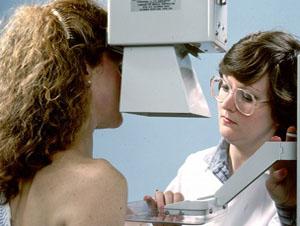Mammograms around the world
Woman undergoing a mammogram. (Image: National Institutes of Health)
The following is a partial transcript; for full story, listen to audio.
Story by Jeb Sharp, PRI’s “The World”
There’s a lot of confusion in the U.S. over the new set of guidelines regarding mammograms. A federal panel suggested that women should start getting yearly mammograms after turning 50, not 40 as currently recommended.
David Dershaw, Director of Breast Imaging at Memorial Sloan-Kettering Cancer Center, says that in much of the rest of the world, women start screening at 50.
“Also, in much of the rest of the world, screening isn’t done every year,” he adds, “it’s done every two or three years. So there’s less mammography that’s available to screen women in much of the rest of the world.”
The basic rationale for less screening in these other countries is financial, not medical, according to Dershaw.
“When push comes to shove, there is an acknowledgement that screening works for women in their 40s, but because breast cancer is less common in the 40s, the cost of finding each cancer is higher and with limited resources; the money is spent where it is most effective.”
While breast cancer is highest in the U.S. and other western industrialized countries, it is also on the rise around the world. But opportunities for screening and early detection in other parts of the globe are not so readily available.
“That’s a function of the lack of monies to acquire the equipment, and it’s also a function of a real lack of trained radiologists to read the films and trained technologists to make the images,” said Dershaw.
The differences in what is available in preventative care across the world is “profound” says Dershaw. He gave this example:
“I remember being once in a former Soviet colony, and the women who were lined up to get mammograms all had advanced breast cancers and the mammographer said all these women will be dead within a couple years. Completely different world in terms of cancer. But more importantly, it was also a different world in terms of the water was contaminated, everybody was smoking, the diet wasn’t healthy. So it was this pervasive environment that is really alien to the way that we live our lives and the way that we see our lifestyle.
“We are lucky to be in a situation where cancer screening is important because it means we live to be old enough to get cancer and that’s not true in many parts of the world.”
As for where he stands on the new guidelines, Dershaw says he has no doubt that screenings starting at age 40 saves lives. But there are other preventative measures women can take to stay healthy.
“I work at a cancer center so I see this every single day, and I strongly encourage women to do all that they can to diminish their likelihood of dying; not only of breast cancer by getting a mammogram every year, but of other cancers. Pap smear, colonoscopy, stop smoking — all of that is part of living a longer and a happier life.”
This story first broadcast on “The World” on November 19, 2009.
PRI’s “The World” is a one-hour, weekday radio news magazine offering a mix of news, features, interviews, and music from around the globe. “The World” is a co-production of the BBC World Service, PRI and WGBH Boston.
